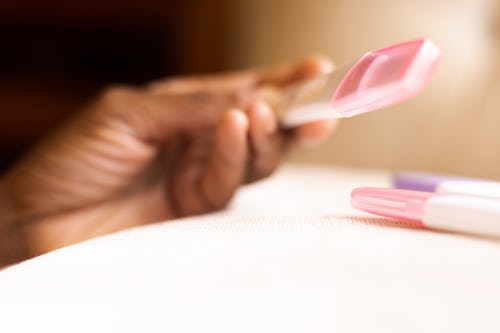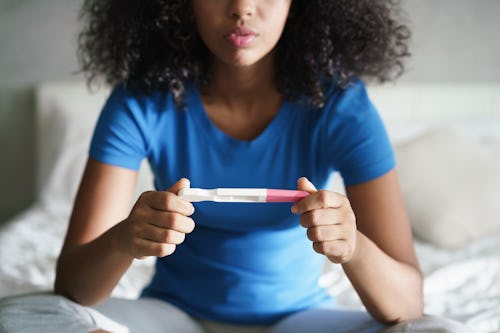
The time between when a woman suspects she might be pregnant and when it is confirmed for sure is the longest of her life. Regardless of whether you are hoping for a positive or a negative result, the odds are good that you are sweating bullets when the time to read the pregnancy test finally comes. And the wait isn't necessarily over upon seeing a result the first time; many women take the test several more times just to be certain. So what happens if you get a different result the next day? Can a pregnancy test change overnight?
Can a pregnancy test change overnight?
The answer is yes. Not only can you get a negative pregnancy test result followed by a positive, but you can also get a positive test result and then a negative. If you take an at-home pregnancy test one morning to find a negative result, it could mean that you’re not pregnant, or it may be that you’re taking the test too early. To wrap your head around this further, it’s helpful to know what pregnancy tests are even looking for.
Why would a negative pregnancy test turn positive overnight?
So, at-home pregnancy tests detect human chorionic gonadotropin hormone (hCG, the pregnancy hormone, detected in your urine). If your numbers are elevated, the pregnancy test will show a positive result. If not, you’ll see a negative result. Most doctors recommend that you wait until after your missed period to take an at-home test, which can be difficult to do if you’ve been trying to conceive for some time. The reason why it helps to wait is because hCG increases throughout your first trimester, so the earlier you take the test, the higher the margin for error because you haven’t given your body enough time to hit the minimum amount of hCG needed to trigger a positive test result.
The explanation for a negative test changing to positive overnight is pretty straightforward and simple. But what about a positive test changing to negative? What does it mean?

Why would a positive pregnancy test turn negative overnight?
If you took a pregnancy test and got a positive result, and then, a few days later, take another one and get a negative, this may be a sign that you’ve experienced a type of miscarriage that is sometimes called a ‘chemical pregnancy,’ explains Dr. Yvonne Bohn, an OB-GYN with Los Angeles Obstetricians and Gynecologists in Santa Monica, California. “A chemical pregnancy is a very early pregnancy that usually ends about a week after the missed menstrual cycle,” explains Dr. Bohn. “In a chemical pregnancy, the hormones of pregnancy are very low and the pregnancy doesn’t develop. The body recognizes and induces a very early miscarriage which is like a delayed menses.”
In cases of these very early pregnancy losses, Bohn explains that the pregnancy test result will usually be a faint positive the first time but the follow-up tests will probably come out negative. Additionally, you will often know that the pregnancy is failing because of menstrual-like bleeding, Bohn adds, saying that people who experience a miscarriage should know that it is not the result of anything that they have done or not done. Painful and upsetting though it may be, it is not your fault. And of course, the very best way to get the most accurate information about the status of your pregnancy is to be seen by your OB or medical provider, who should be able to provide support and guidance through this experience and into whatever next steps feel appropriate and comfortable for you.
Expert:
Dr. Yvonne Bohn, OB-GYN with Los Angeles Obstetricians and Gynecologists in Santa Monica, California
0 comments:
Post a Comment